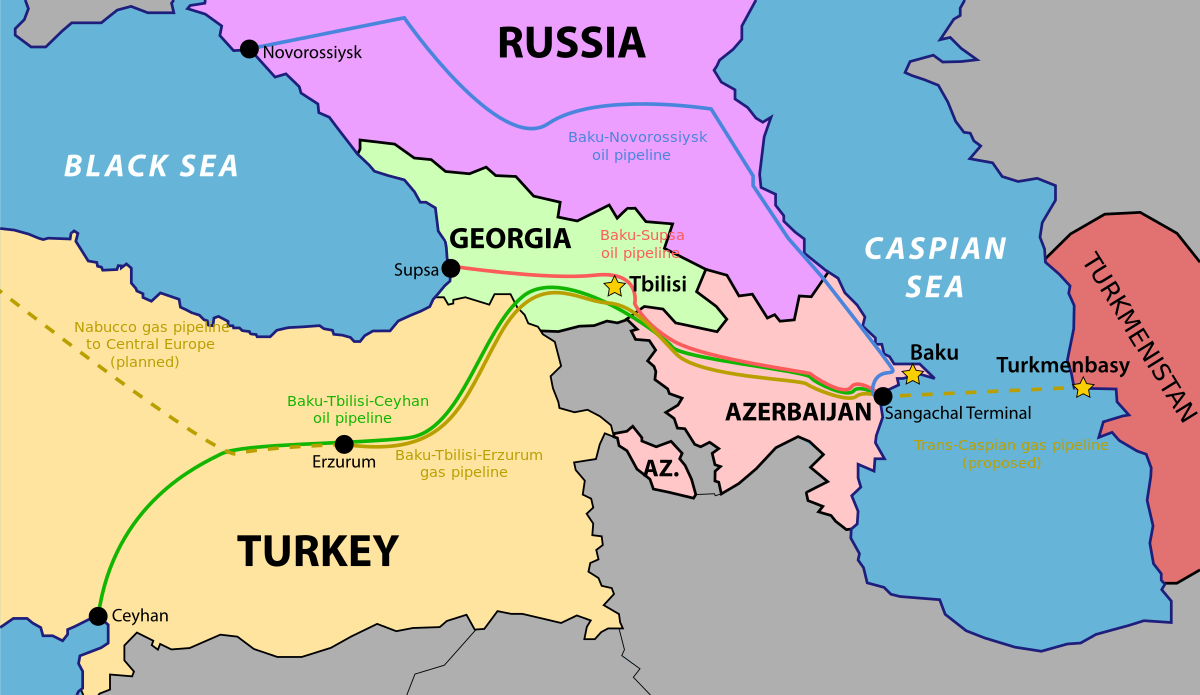With 265 trillion cubic feet (Tcf) of proven gas reserves as of 2017, ranking 6th in the world and accounting for about 4% of the world’s total natural gas reserves of 6,923 Tcf, the Central Asian Republic of Turkmenistan is eager to expand its gas market.
In July last year, Turkmenistan made a bizarre announcement saying it was ready to redraw the map of natural gas infrastructure, which envisaged linking Central Asia and the South Caucasus with Turkey and onward to Europe.
Observers wondered whether the proposal would, in reality, see the light of the day. So far, the project has not moved beyond discussions.
Till the beginning of Russia’s military action against Ukraine in 2022, Moscow had its grip on the European markets for natural gas. The EU imported 83 percent of its gas requirement, much of which came from Russia.
In the third quarter, the EU’s import of Russian gas was to the tune of 39 percent, but after the Ukraine war began, it fell to just 12 percent in the third quarter of 2023.
Transit Routes
As the Ukrainian war procrastinated, the EU did not impose sanctions on the import of Russian gas. Some of the EU member countries, like Spain and Belgium, increased their purchases of Russian liquefied natural gas (LNG).
The pipelines remain the main conduits of oil transportation from Russia. The main route for carrying Russian gas to Europe was a Soviet-era pipeline network through Ukraine and Belarus.
In a transit deal of 2019, Russian Gazprom would pump more than 40 billion cubic meters per year via Ukraine, a trade that earned Kyiv up to $ 7 billion annually in transit fees. Among the main buyers are Hungary, Austria, Slovakia and Italy.
The Nord Stream I and II, the path through Ukraine, was destroyed by sabotage in September 2022, and the Gazprom transit deal with Ukraine will expire at the end of 2024.
EU’s Search For New Routes
This situation brings the European Union face to face with the problem of regular supply of LNG. The pipelines were built at a significant expense and in defiance of strong opposition from the US, and also some EU member states.
Now, the only viable path is via the Black Sea to Turkey and into Southern Europe. Under the strategy of diversification of supply sources away from Russia, it is thinking of increasing gas deliveries from Azerbaijan.
According to an agreement between the EU and the Azerbaijan state authorities, the quantum of gas supplied to the EU is likely to double by 2027, reaching 20 bms per year.
One opinion is that it will not have much impact on the flow of Russian gas. It also does not answer the question of how Hungary and Austria will adjust when the flow of Russian gas through Ukraine is halted.
By strange coincidence, Turkey emerges to be an important player in this big game. It is 99 percent dependent on imported gas, currently receiving about 40 percent of that from Russia via the Blue Stream and Turk Stream across the Black Sea.
The former is exclusively for Turkish use, the latter makes landfall in the European part of Turkey and supplies countries in southern and Eastern Europe, like Greece, Bosnia and Herzegovina, Romania, Serbia and Hungary.
There is concern in some European countries that Turkey could accept the Russian proposal to set up a joint hub for gas trade, allowing Gazprom to pump its gas into the Turkish mix.
This proposal came from President Putin towards the closing months of 2022 when he felt that Russia’s other paths into Europe could be closed.
Gas from this hub would not be dubbed as Russian and, as such, may not face objection by the EU member states. Though the project has not made much headway so far owing to the question that would control the enterprise, nonetheless, Russian footfall would be there.
The crux of the entire narrative is whether, given the opposition of Russia and Iran to the TCP, the pipeline will ever see the day when the Trans-Caspian link is established. Russia and Iran, both have stubbornly opposed the laying of the TCP.
Their opposition was on a political and economic basis. However, it appears that Ashgabat (Turkmen capital) has taken a firm decision based on the 2018 Convention on Legal Status allowing adequate legal basis for building TCP.
Previously, Turkmen gas was exported to Russia via Uzbekistan and Kazakhstan. But after the implosion of the Soviet Union, Turkmenistan was free to take care of its interests.
The proposed TCP would run under the Caspian Sea from Turkmenbashi in Turkmenistan to the Sangachal Terminal in Azerbaijan, where the natural gas will connect to an existing pipeline network to reach European customers.

Conclusion
As long as the export of Russian gas to the EU states was assured, Russian gas continued to flow into the European markets. But realizing that Nord Stream I and II were no longer available and the pipeline agreement with Ukraine would terminate in 2024, the EU has roped in both Turkey and Azerbaijan to be the components of transportation of Turkmen gas to Europe.
Obviously, Azerbaijan will get the maximum benefit from this project. Maybe, once the TCP is brought to completion, it will help build a network of roads and bridges in the Trans-Caspian region and ultimately get linked to the North-South Corridor.
- KN Pandita (Padma Shri) is the former director of the Center of Central Asian Studies at Kashmir University. Views Personal of Author.
- Follow EurAsian Times on Google News




